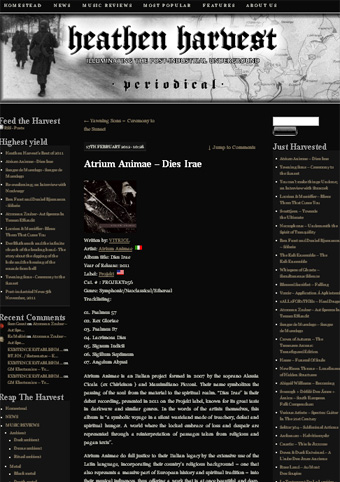Reviews
home > Reviews > heathenharvest_review
[ITALIANO]
REVIEW: ATRIUM ANIMAE - DIES IRAE
HEATHEN HARVEST PERIODICAL
[FEBRUARY 2012] 2012 | FEBRUARY
RATING: 5/5

| Read here: Heathen Harvest Periodical
Atrium Animae: 'Dies Irae' - CD Review
by Vitriol
Atrium Animae is an Italian project formed in 2007 by the soprano Alessia Cicala (ex Chirleison ) and Massimiliano Picconi. Their name symbolizes the passing of the soul from the material to the spiritual realm.
“Dies Irae” is their debut recording, presented in 2011 on the Projekt label, known for its great taste in darkwave and similar genres.
In the words of the artists themselves, this album is “a symbolic voyage in a silent wasteland made of treachery, defeat and spiritual hunger. A world where the locked embrace of loss and despair are represented through a reinterpretation of passages taken from religious and pagan texts”.
Atrium Animae do full justice to their Italian legacy by the extensive use of the Latin language, incorporating their country’s religious background – one that also represents a massive part of European history and spiritual tradition – into their musical influences, thus offering a work that is at once beautiful and deep.
Heavily reminiscent of medieval ecclesiastical works, but also of ethereal neoclassical acts such as Dead Can Dance and Arcana, the respect and spirituality emanated by this recording is admirable.
It sweeps through centuries of worship concentrating on the essential function of it: the relief of the agonies of mundane existence, the search for light, for truth, for God. The prime figures of Catholicism assume here their rightful position, as symbols of enlightenment and guides to the person’s esoteric transformation.
The secular aspect of religion is entirely cast off, as the listener immerses in this rare angelic beatitude.
Characterized by solemn, economically planned arrangements, the instruments accompany the voices where needed, but retain their place as a means to accentuate the vocal vibrations, rather than to overtake them.
The voices here are everything, the alpha and the omega, man’s hieratic attempt to ascend to the heavens.
Circling round the main theme of the despair caused by the loss of God’s grace, and the punishment ensued thereof, “Dies Irae” is a selection of Latin psalms and hymns that are either calls to the divine power, or descriptions of an apocalyptic scenery in the biblical meaning of the term.
“Psalmus 57” announces the chastisement of the wicked by the wrath of God, in a mournful, slow, austere manner, while the merciless nature of the punishment visited upon the sinners is matched by an intense, passionate crescendo at the end of the track.
Similarly, “Psalmus 87” is a lament over the misfortunes of the sinner’s life, and his ineptitude to reach God through prayer. Doubt and abandonment are expressed mainly through imitative and occasionally non-imitative polyphony. The atmospheric, high-pitched strings and autumnal ambience in the background emphasize the inescapable desolation.
“Lacrimosa Dies” (the day of tears) is a phrase taken from the Latin hymn “Dies Irae”, describing the day of Judgement, when the worthy shall be absolved and the wicked punished.
The track is one of stately magnificence, where beautiful, majestic strings, soprano voice and a variety of different polyphonies express the sense of hurt, but also that of repentance, relief and absolution. Definitely one of the best tracks in this album, and one of the best I’ve generally listened to.
“Signum Iudicii”, my favourite in the recording as far as one can actually make a choice, contains impressively deep vocal vibrations very reminiscent of Lisa Gerrard’s performances in renowned Dead Can Dance tracks such as “Persephone” and “Summoning of the Muse”.
The apocalyptic message conveyed here is brought to a close with the final two tracks. “Sigillum Septimum” is an extract from the Latin Vulgate (Revelation, 8:1) that refers to the breaking of the seventh seal, and musically it continues a discreetly gradual course that can be observed after a few listens, from the simpler polyphonies and accompanying melodies of the initial tracks to more complex, simultaneous vocal combinations and orchestrations ranging from the monastic and sepulchral to the ethereal and melodic – all of which elements can be found in this track.
The final track appropriately refers to the angel of the abyss, Abaddon (Revelation 9:11), whose name signifies destruction. The funereal trumpets, processional rhythms and monotone, hollow percussions emphasizing the voices slowly culminate in a prophecy of doom.
“Dies Irae” is perfect in every way one chooses to look at it, displaying an incredibly elevated level of technical achievement, in vocal performances as well as orchestrations and execution.
Alessia Cicala’s voice is nothing if not awe-inspiring, and the old and much used (and misused) concept of religious devotion, repentance and punishment is here inspired with an air of ingenuity, originality and classical harmony.
Whatever musical influences are discerned in the beginning are quickly put away, as this recording stands out in its own right as one of the best in the genre.
Genuinely emotional music that burns bright to the heart’s very core, casting off all layers of superficiality with a remarkable ease, as precise in its certainty as is the calling of true, sincere faith.
The experience is similar to a personal revelation, and in that sense it remains true to the origins and purpose of religion.
Regardless of the beliefs you hold it is impossible not to be moved by it.
Rating: 5/5
ATRIUM ANIMAE | DIES IRAE [OFFICIAL TRAILER]
ATRIUM ANIMAE | REX GLORIAE [OFFICIAL]
[BACK]

